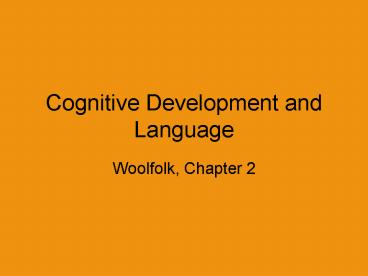Cognitive Development and Language PowerPoint PPT Presentation
1 / 13
Title: Cognitive Development and Language
1
Cognitive Development and Language
- Woolfolk, Chapter 2
2
Maturation (genetics)
Physical
- Development
- Different rates
- Orderly
- gradually
Social
Cognitive
Personal
3
- Using a person next to you, discuss and be ready
to present in class an example of - Physical
- Cognitive Development
- Social
- Personal
Now comes the movie?How the brain develops
4
Again, using your partner, please answer the
following questions regarding the movie you just
saw 1. In a paragraph, describe any information
that is new that you. 2. Also, describe
information that was exciting.
5
Piaget
- Tendencies in Thinking
- Schemesmental categories
- 2) Organizationarranging information
- 3) Adaptation (adjustment to
- the environment)
- Assimilationnew info into
- existing schemes
- Accommodationaltering
- existing schemes
Influences on Development Maturaltion Activity
Disequilibrium out of balance
6
- Using that same partner, give one example of
- A scheme
- Organization
- Adaptations two phases
- Assimilation
- Accommodation
- Also, why is it important
- to disequilibrate students
7
Sensorymotor Begin using imitation/ memory/
thought Object permanence Goal directed
activity
Preoperational Use of language think in
symbolisms Operations Collective
Monologue Semiotic functioning (ideas) Egocentric
behavior one direction cannot see
others point of view
Four Stages Cognitive Development
Concrete Operational Hands-on problems Conservatio
n?remain the same despite changes in
appearance Decentering Classify and
seriate Reversibility/identity Compensation
Formal operations Solve abstract problems
More scientific thinking Social issues and
identity Adolescent egocentrism
8
- Give examples of
- Object permanence
- Goal directed actions
- Operations
- What is the difference between egocentric
behavior as demonstrated by a two year old and a
teenager? - Why some people do not reach the formal
operations stage? - Why should we teach in a broad manner using the
students life?
9
Implications of Piagets TheoryS
Stayed here!
- The problem of the matchare students being
taught at their level? - Individuals construct their own understanding
- This is done through interactions where students
are challenged, and receive feedback
disequillibration - The value of play
- The trouble with stages
- Thinking changes
- Underestimating childrens abilities
- The language used
- Cognitive development and culture?East vs. West
10
Vigotsky
Sociocultural Theory Human activities
?cultural setting Co-constructed with peers
and teachers
Cultural Tools Symbols such as language,
graphs, numbers for society to communicate
Socio Cultural Perspective
Role of language in a cultural setting Private
speech Self talk and learning
The role of learning and development Learning
passive formation Development
active construction
- Implications of Vygotsky for
- Teachers
- Assisted learninggtscaffolding
- Zone of proximal development?
- help students reach their potential
- c) Private speech and the zone?
- students reach their potential
Limitations Did not explain Cognitive processes
underlying development
11
- Use your partner again and give
- one example of how children learn
- the culture of their community in the
classroom - In this example, mention one cultural tool that
should be used - Give an example of the zone of proximal
development - Is private speech good for children? Give an
example to support your answer.
12
Implications for Teachers
- Piaget
- Understanding and building students thinking
- Activity and constructing knowledge
- The value of play
- Vygotsky
- The role of adults and peers
- Assisted learning
- Teaching at the magic middle and zone of proximal
development
Funds of knowledgebases for teaching
Use students background
13
Development of Language
- Dual language learning
- 6 mil kids in the USA (2000)
- Learning a second language does not interfere
with understanding in the first language (in
fact, the more the better) - Critical period for pronunciation childhood
- Two languages bicognitive development
- Language development in the school years
- Pronunciation
- Syntax (word order)
- Vocabulary and meaning
- Pragmantics
- Metalinguistic awareness
- Partnerships with families
- Involve family
- Provide home activities

